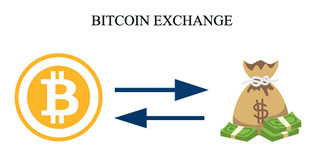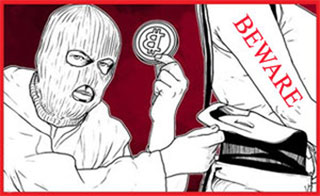WHAT IS BITCOIN SCAM ?
A Bitcoin scam is a form of online cryptocurrency fraud that takes advantage of the open-source, decentralized nature of Bitcoin. Blockchain technology powers Bitcoin, and its most distinguishing characteristic is decentralization—i.e., it has no central bank or single administrator. Bitcoin payments can be made nearly anywhere, at any time, with low fees. The network is peer-to-peer, with transactions possible between users directly without an intermediary. Since Bitcoin permits parties to send and receive money without necessarily being connected to a genuine-world identity, it can come across as attractive to scammers as well as cybercriminals. It was designed as an off-ramp currency to purchase goods and services, but its anonymity and lack of oversight have also utilized it as an instrument of fraud.Scammers have preyed upon individuals ever since the discovery of money, and Bitcoin has emerged as a good tool for a number of reasons:
? Very few people fully understand how it works.
? It provides greater anonymity.
? It is largely unregulated.

DIFFERENT TYPES OF BITCOIN SCAM
1. The Fragment Ploy :
Bitcoin Savings and Trust was a notorious cryptocurrency scam that operated as a classic Ponzi scheme, initially presented as an ICO (Initial Coin Offering). In a Ponzi scheme, the operator provides fake investment reports and pays returns to earlier investors using funds from newer ones, rather than from legitimate profits. The scam promised investors exceptionally high returns—up to 7% per week—and continued to attract more victims over time. Ultimately, more than 265,000 bitcoins were stolen through this fraudulent scheme. The operation collapsed in 2012, and its mastermind, Trendon Shavers, was arrested. He was later sentenced to prison and ordered to pay a $40 million fine. At the time of his sentencing, the value of the stolen bitcoins was estimated at around $97 million.

2. Silk Road's Ridiculous Email Trap :
Silk Road was an infamous black market platform used for buying and selling drugs and various other illegal goods over the internet. After shutting down the site, the government decided to auction off the Bitcoins seized from Silk Road and contacted potential participants to inform them about the auction. However, due to a classic “bcc” (blind carbon copy) email mistake, all recipients could see the full list of people the email was sent to. That list was quickly copied, stolen, and sold. As a result, a wave of scam emails was sent to those individuals, many of whom were already interested in purchasing Bitcoins. These emails impersonated government officials or related agencies, requesting sensitive information that scammers then used to steal Bitcoins from the victims.

3. Bitcoin Gold and False Promises :
Bitcoin Gold was launched as a fresh take on cryptocurrency, aiming to shake up how digital currencies work. While the project did raise some concerns in the crypto community, it wasn't breaking any laws. Still, scammers jumped on the buzz and created a fake website called mybtgwallet.com. They claimed it would help users set up Bitcoin Gold wallets, but to do that, people had to enter their private keys—the codes that protect their crypto. That small but deceptive move led to the theft of over $3 million in Bitcoin and other digital currencies. What made things worse was that the creators of Bitcoin Gold were unknowingly tied to the scam, which badly hurt the project's reputation.
GUIDE TO AVOID BITCOIN SCAM
1. Fraudulent Bitcoin Exchanges :
When you go to any cryptocurrency exchange website, the first thing that you should look for is if it is HTTPS-secured, rather than just HTTP. HTTPS means that web traffic is secure and encrypted. If the website only has HTTP—no "S"—then it's a huge warning sign, and you should never use it. Another popular scam is disguised exchange websites that promise to allow users to sell their Bitcoin. These websites usually show a web form requesting your email address and how much Bitcoin you wish to sell. Once you submit the form, you're presented with a QR code to send your Bitcoin. But once you've sent the Bitcoin, the funds that were promised never materialize, and the scammer takes away your cryptocurrency.

2. Fake Bitcoin Wallets :
Identifying counterfeit Bitcoin wallets is laborious, since wallets are mostly designed for storing Bitcoin, not selling it. Usually, there are imitation Bitcoin wallets that are scammers targeting to install malware on your device with the purpose of stealing your password or private keys. Similar to the imitation of Bitcoin exchange websites, be sure to verify that the website is secure (HTTPS). Although it might be hard to spot an imitation wallet, a good habit is to inquire with reliable friends or online forums if someone has ever used the wallet.
3. Phishing Scams :
This is a most prevalent fraud. Phishing involves trying to make you think that he is a reputable and safe company or site by leading you to an imitative one. More often, phishers can send you an email or use fake web pop-ups. The safe approach is not to click on links in an email or open attachments. Instead, go directly to the official website if you need to conduct business. A common tactic used in phishing emails is to disguise a hyperlink to make it appear legitimate, but if you hover over it, you'll see a different, fake URL. Always check the sender's email address to verify its authenticity. With fake web pop-ups, be cautious about the sites you're redirected to. For instance, a number-one search result could be a Google advertisement but turn out to be a phishing site for a fake Bitcoin wallet. To be on the safe side, don't click on sponsored ad pop-ups within search results and always type the official website address directly into your browser.

4. Ponzi Scams :
Ponzi schemes usually involve outlandish claims made on a website or similar platforms. Although such websites might be hard to spot initially, it's easier to identify them once you know the signs. One typical characteristic of Ponzi websites is the use of referral schemes, where individuals are encouraged to get others to join so that they can get rewards. A big warning sign is the constant flooding of social media with common links containing referral codes in the URL. They usually appear something like this: domain.com/ponzi/?ref=13434.
5. Cloud Mining Scams :
This is devious because not everything related to cloud mining is a scam. There are some that are completely legitimate, but then there are many that are scammer efforts, so it's wise—especially for newbies—to be careful when looking into cloud mining opportunities. Cloud mining is based on collective resources, whereby people invest money to rent high-powered Bitcoin mining equipment. Transacted honestly and regularly, this system can be valuable. In fraudulent situations, the returns are usually extremely minimal or non-existent.

CONCLUDING THOUGHTS
As noted above, it's always better to listen to your instincts and remain vigilant for warning signs. Although there are a lot of scams on the Bitcoin scene, you don't have to be one of them. Most of them can be avoided by merely staying awake, aware, and careful. If you're already in the Bitcoin community—or are about to enter it—watch for the scams discussed above and always double-check before acting.

SOME EXAMPLES OF BITCOIN SCAM AROUND THE WORLD
1. South Korea dismantles $24 million Bitcoin Pyramid Scheme :
Two individuals found guilty of operating a Bitcoin pyramid scheme that attracted over $24 million in investments were sentenced by a South Korean court. According to the Korean news agency Yonhap, the first individual is believed to be the mastermind behind the multi-level investment scam, which was based in the Philippines and promised high returns through Bitcoin investments. The second individual, who served as the company's chairman and managed the investment funds, is currently cooperating with Interpol in efforts to locate the lead scammer.
2. Japanese Police arrest 12 people in $1.8 million fake bitcoin scam :
The report states that the accused men deceived the agent by presenting a suitcase allegedly containing $200 million—most of it in counterfeit currency. The victim, a Bitcoin seller, transferred his digital assets to the wallet of a Yokohama-based exchange operator. After receiving the cryptocurrency, the men falsely claimed they had not received the coins.

3. Indian Woman Shares Credentials with Scammers, Loses $55,000 in Bitcoin:
Police in Delhi, India, are probing for a case of Bitcoin theft after a woman allegedly lost about $55,000 worth of cryptocurrency. The woman's online wallet was hacked into after she unwittingly provided her login credentials to scammers, reports said. Investigators suspect the scammers used her credentials to open her wallet and steal the money. A comprehensive cybercrime inquiry is now being conducted.
4. Austrian Bitcoin Scam : 10,000 Victims Lose $115 Million :
New information has emerged about the "Optioment" investment scheme in Austria, whose operators are accused of stealing over $116 million from more than 10,000 victims. The scheme promoted itself through a now-defunct website as a "premier global Bitcoin investment product," luring investors with promises of high returns. Authorities are continuing their investigation into the fraudulent operation.

Feel Free to use our Spam Checker Tool
We are providing the
Spam
Checker Tool for your convenience. Here you can enter the
email or the contact number that you suspect to be a scam. This
tool checks it with our spam database list and ensure you regarding
the email or the phone number is real one or the bogus.
Report scam to United States government-you could file a
complaint
about scam or other crime here.
Related links:
Charity Scams
The act of using deception to get money from people who believe they are making donations to charities Read More...
Church Scams
Church scam traps adventure trust and expense their victimized people a huge number of dollars. Read More...









